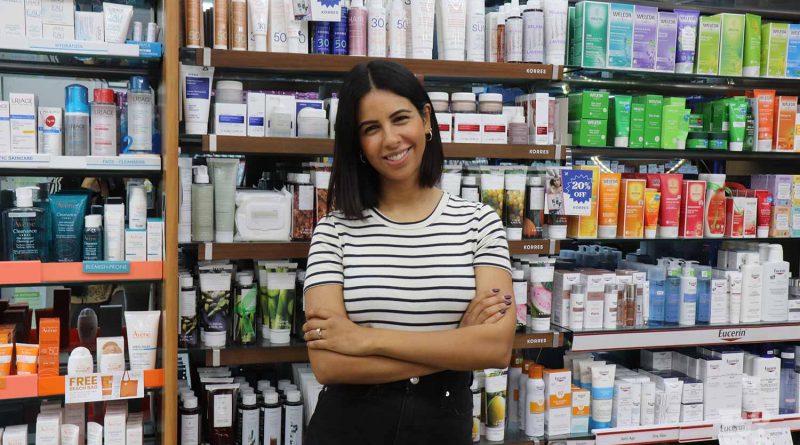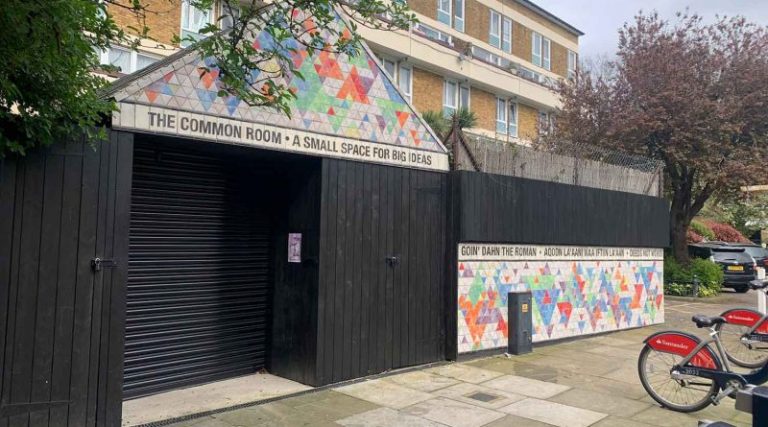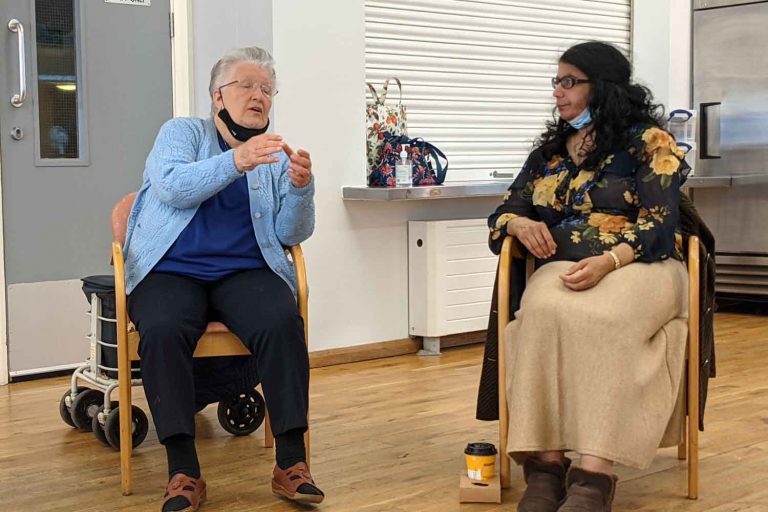Why community pharmacies like Sinclairs are the key to the NHS’s endurance
Anika Jagot from Roman Road’s Sinclairs on the rise of community pharmacies and the need for preventative care amid a healthcare crisis.
A mecca of East End life for generations, it might seem impossible to pinpoint the ‘heart’ of Roman Road, which stretches for 1.4 miles from Bethnal Green all the way to Hackney Wick.
But if you had to cast your vote, you may settle on the fork in the road created by Gladstone Place, where people spilling out of Tesco and the Idea Store greet Café Creme’s regular band of customers watching the world go by come rain or shine.
Opposite Café Creme you will find Sinclairs Pharmacy, which was opened by Bindesh and Jaymini Patel 37 years ago and has been a constant presence in the community ever since.
Joining the pharmacy in 2015, Anika Jagot, 37, is a relatively new addition to the Sinclairs team, many of whom have been working there for well over 20 years and who Jagot describes as a ‘family’.
Alongside her part-time role at Sinclairs, Jagot also works at St. Stephens Health Centre in Bow, providing a vital link between the local GP and pharmacy located just a five-minute walk from each other.
Today, a strained NHS coupled with the UK’s ageing population is creating a plethora of cultural, financial and administrational challenges for community pharmacies like Sinclairs, whose role has never been so important for the longevity of the country’s healthcare system.
According to the British Medical Association (BMA), the number of people on NHS waiting lists has increased from 2.34m in 2009 to over 7m today, bringing renewed vigour to the debate around the role that community pharmacies can play to lessen the burden on GPs and other NHS services.
What really needs to happen is a shift in mindset towards prevention rather than relying on an underfunded services that serves a purpose really to treat
Anika Jagot
Earlier this year, the NHS published its long-term plan to deal with the increasing demand for medical treatment, which aims to lower the strain on GP surgeries by outsourcing some services to pharmacies.
Chapter 2 of the plan is dedicated to preventative measures to help people stay healthy and moderate demand on the NHS. It states: ‘Action by the NHS is a complement to – not a substitute for – the important role of individuals, communities, government, and businesses in shaping the health of the nation.’
As the face of healthcare on the high street, community pharmacies are best placed to give advice to patients about preventative care and encourage them to take ownership of their healthcare.
In May 2023, the government pledged to invest £645m in a ‘Pharmacy First’ service in England before the end of the year, allowing pharmacists to supply medicines for seven common health conditions including sore throats and earaches, though this has not yet been implemented.
‘The thing on everyone’s lips right now is: I can never get a GP appointment, but there’s so much more strain on doctors’ time than there used to be,’ says Jagot.
‘I think people forget that one of the main roles of a pharmacy is to be the first place where people go for advice … If we don’t have the answer then we can send you to someone who has got the answer. We’re very good at telling people where to go.’
According to Jagot, during Covid people took more responsibility to be actively involved in their healthcare, but as society returned to normal, so did old habits.
‘We also have a lot more patients to deal with now, particularly people who’ve been diagnosed with chronic illnesses since Covid,’ she says.
Referring to the NHS’s long-term plan, Jagot explains: ‘One prong of that is to get pharmacists into GP surgeries to answer the questions that GPs don’t have time to answer,’ which is part of her role at St. Stephens Health Centre in Bow.
Last September, Jagot retrained as a prescribing pharmacist meaning that she can prescribe medicines and antibiotics directly from Sinclairs, thereby freeing up GP appointments for more serious illnesses.
According to an Ipsos poll last year, most people in the UK had not visited or contacted a pharmacy frequently in the preceding 12 months, suggesting a limited awareness of the broader services offered by pharmacies.
Equally, Ipsos found that 90 per cent of people with a minor illness would be comfortable seeing a pharmacist on the same day, revealing a public appetite for expanding pharmacy services.
Having worked in the area for almost a decade and living down the road in Globe Town, Jagot specialised in hypertension to raise awareness of undiagnosed high blood pressure and the issues it causes, which are particularly prevalent in the local area.
On World Hypertension Day in May Jagot and the Sinclairs team administered free blood pressure checks to over 125 patients at the Idea Store in Bow, giving out advice and information on how to lower your blood pressure.
However, the long-term success of community health drives also depends on the participation of patients.
As Jagot explains: ‘Studies have shown that people who take an active interest and measure their blood pressure daily will lower their blood pressure in a year, because if you’re aware of something and you understand something more, the better you can manage it.’
‘What really needs to happen is a shift in mindset towards prevention rather than relying on an underfunded service that serves a purpose really to treat,’ she says.
‘What you’re doing today is really going to impact you in 10 – 20 years time, and we’re not very good at grasping that concept.’
Educating patients and dispelling healthcare myths are large parts of Jagot’s role in the community.
According to Jagot, many people are hesitant about taking statins to lower cholesterol and lower your risk of cardiovascular events, ‘but taking a statin is one of the best things you can do for your health.
‘When you take a statin you don’t notice a difference in yourself … it might not seem to be doing much but it is really impacting on your quality of life. It’s quite conceptual and it’s very hard to get that across to patients,’ she explains.
Jagot’s intimate understanding of the community’s needs and willingness to go the extra mile for her patients are qualities shared by all of the staff at Sinclairs.
Whether it be by signposting the Bow Geezers Club for a lonely older resident or hand-delivering medication to patients’ houses to make sure they get their tablets in time, Sinclairs’ customer care is unmatched by chain pharmacies such as Boots or Lloyds.
‘The staff have been there for donkey’s years and know everyone by name which makes such a difference,’ says Jagot: ‘Patients say that they wouldn’t go anywhere else and I think it’s all about consistency, listening and empathy, which everyone does in droves.
‘And I’ve always said that Bindesh Patel has got to be the hardest working person on the Roman.’
And yet, no matter how well-oiled the Sinclairs team is, Community Pharmacy England announced this year that without urgent injections of funds, pharmacies across the country cannot deliver the ‘pharmacy first’ approach that ministers have envisioned to relieve NHS pressure.
‘I think I would speak on behalf of pretty much every member of every pharmacy team in hospitals, communities, in prisons when I say that pharmacies play such a pivotal part in the NHS but they are hugely, immensely underfunded and underappreciated’ says Jagot.
‘Ultimately the longevity of the NHS depends on how much money our government is willing to give it. There’s really no two ways about it … it comes down to the fact that it’s very overstretched and the people that need it are not being paid.’
Despite the unsettling picture, Jagot, for one, is not daunted by the future: ‘I kind of feel excited,’ she admits: ‘What I mean by that is that I think there’s hope. There are steps being taken like the long-term plan and there are people being trained right now to be able to help.
‘So if we use the resources we have properly we might just be able to figure it out,’ she says.
Asking your pharmacist for advice before going to your GP, paying for your prescription if you can afford it, and knowing that some ailments can be diagnosed at your local high street pharmacy are just some ways that Jagot says individuals can help.
‘We are here to make the quality of patients’ lives better and to help them get the best out of their medication but we’re still human and there are still processes,’ she says.
And her top tips for looking after your personal health?
‘Water, SPF, and incorporating one new vegetable into your meals every day,’ she laughs: ‘I don’t know whether I’m saying that because I have a three-year-old, but it’s worked: her new favourite food is broccoli.’
If you enjoyed this article, you might like our piece about another local hero, British Bangladeshi actor and film director, Islah Abdur-Rahman.








